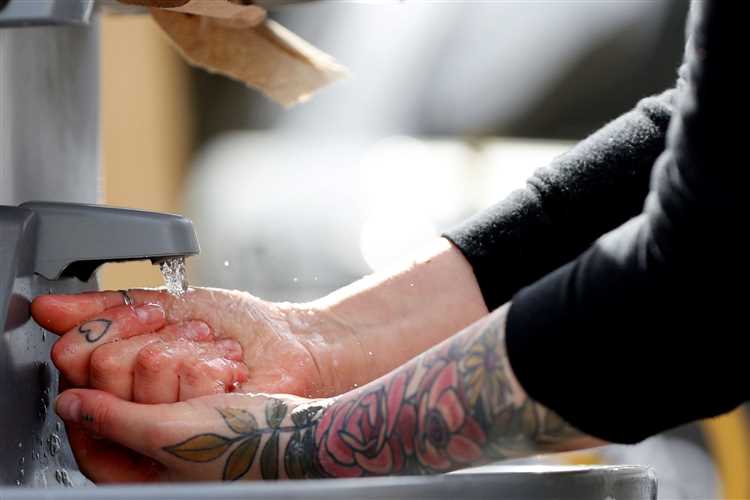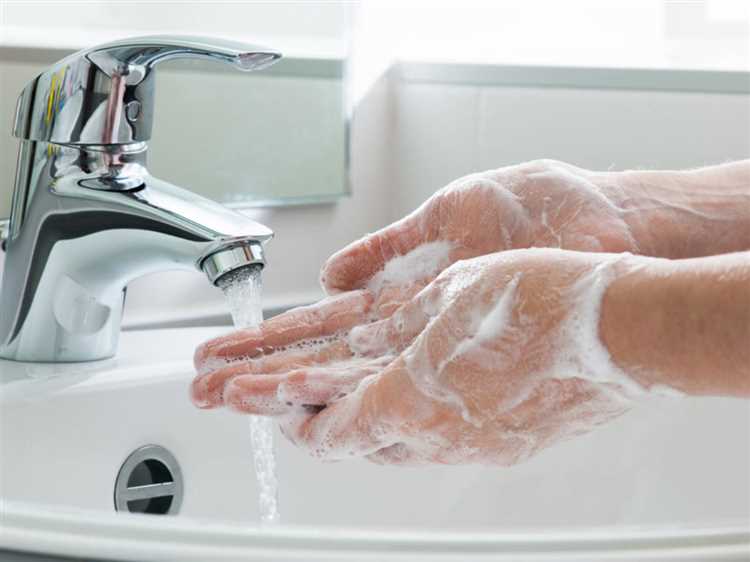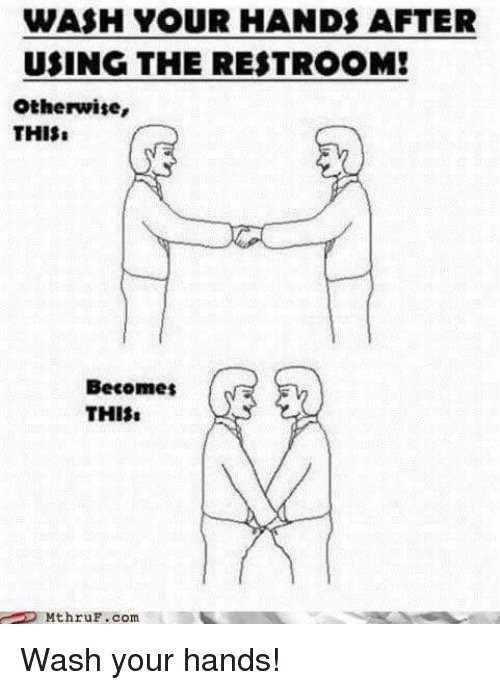
It may seem like a simple question, but the answer is not as straightforward as you might think. Many men argue that they don’t need to wash their hands after using the bathroom, especially if they only went for a quick pee. However, there are several reasons why it is important for guys to wash their hands after peeing:
1. Hygiene: Washing your hands is a basic hygiene practice that helps prevent the spread of germs and bacteria. Even if you believe your genitals are clean, there are still invisible bacteria that can be transferred to your hands during urination. By washing your hands, you eliminate these bacteria and reduce the risk of spreading them to others.
2. Contamination: The act of urinating involves touching your genitals, which can introduce bacteria and germs to your hands. If you fail to wash your hands, you can easily transfer these microorganisms to other objects or surfaces that you come in contact with, such as doorknobs, light switches, or food items. This can potentially lead to the transmission of diseases or infections.
3. Social responsibility: When using public restrooms, it is crucial to wash your hands not only for your own health but also for the well-being of others. By neglecting to wash your hands, you increase the likelihood of contaminating communal areas, exposing other people to harmful pathogens. Washing your hands after peeing is a simple yet effective way to show consideration and respect for those around you.
So, the next time you use the bathroom, even if it’s just for a quick pee, remember the importance of hand hygiene. Take a few extra seconds to wash your hands properly with soap and water. Your health and the health of those around you will thank you for it.
- Importance of Hand Hygiene
- Preventing the spread of germs
- Conclusion
- Daily Routine
- Preventing Germs Spread
- The Importance of Hand Hygiene
- Washing Hands After Urination
- Health Benefits
- Prevention of Infections
- Promoting Overall Hygiene
- Personal Hygiene
- Public Health
- The Importance of Handwashing
- Hand Hygiene in Public Spaces
- Good Habits
- The Importance of Hand Hygiene
- Proper Hand Washing Technique
- Q&A
- Should guys wash their hands after peeing?
- Is it really necessary for guys to wash their hands after peeing?
- What harm can come from not washing hands after peeing?
- Can’t guys just use hand sanitizer instead of washing hands after peeing?
- How long should guys wash their hands after peeing?
- Is it necessary for guys to wash their hands after peeing?
- What are the risks of not washing hands after peeing?
Importance of Hand Hygiene

Hand hygiene is a crucial aspect of maintaining good health and preventing the spread of diseases. It involves washing your hands with soap and water or using hand sanitizers to remove dirt, germs, and harmful bacteria.
Regularly washing your hands is especially important after using the restroom to prevent the transfer of fecal-borne pathogens. Studies have shown that fecal matter can be present even on visibly clean hands after using the toilet. Therefore, it is vital for guys to wash their hands after peeing to ensure proper hygiene.
Failure to practice good hand hygiene after using the restroom can lead to the spread of various infections, such as urinary tract infections (UTIs), gastrointestinal illnesses, and respiratory infections. These infections are often caused by bacteria that can be found in urine or feces and can be easily transferred to surfaces or other people through touch.
Preventing the spread of germs
Washing hands with soap and water for at least 20 seconds is the most effective way to remove dirt and germs from the hands. It helps to eliminate harmful bacteria that can cause illness, including those that are antibiotic-resistant. Hand sanitizers can be used as an alternative when soap and water are not available, but they are not as effective at removing certain types of germs.
By practicing proper hand hygiene, guys can protect themselves and others from the transmission of infections and maintain overall good health. It is a simple yet powerful practice that should be followed consistently to reduce the risk of illness and promote well-being.
Conclusion
Hand hygiene plays a significant role in preventing the spread of diseases. Guys should make it a habit to wash their hands with soap and water after using the restroom to maintain proper hygiene. By doing so, they can help protect themselves and the people around them from the transmission of harmful bacteria and prevent the occurrence of infections.
Daily Routine
Establishing a daily routine can help individuals maintain good hygiene and promote overall health. A consistent routine can reduce the risk of illness and improve personal well-being. Here are some essential habits to include in a daily routine:
- Washing hands regularly: It is important to wash hands frequently, especially before and after engaging in activities that may introduce germs or bacteria. This includes using the bathroom, preparing food, and handling pets.
- Brushing teeth: Brushing teeth at least twice a day, preferably in the morning and before bed, helps remove plaque and prevents tooth decay and gum disease. It is also essential to replace toothbrushes every three to four months or sooner if the bristles become frayed.
- Showering or bathing: Daily showering or bathing helps to cleanse the body, remove sweat and oil, and maintain skin health. It is important to use soap or body wash to thoroughly clean the entire body.
- Changing clothes: Regularly changing clothes helps to maintain cleanliness and prevent the buildup of odors or bacteria. Clothes should be washed regularly, especially underwear and socks.
- Eating a balanced diet: Consuming a balanced diet that includes fruits, vegetables, lean proteins, and whole grains promotes good health. A healthy diet provides essential nutrients and helps to maintain a strong immune system.
- Drinking water: Staying hydrated is crucial for overall health. Drinking an adequate amount of water throughout the day helps to regulate body temperature, support digestion, and maintain healthy skin.
- Getting enough sleep: A good night’s sleep is essential for physical and mental well-being. Establishing a regular sleep routine and aiming for seven to nine hours of quality sleep each night can help improve focus, mood, and overall productivity.
- Exercising regularly: Engaging in regular physical activity is important for maintaining fitness and promoting overall health. Whether it’s going to the gym, participating in sports, or simply taking a brisk walk, staying active helps to improve cardiovascular health, build strength, and reduce stress.
- Managing stress: Stress can have negative effects on both physical and mental health. Incorporating stress management techniques into a daily routine, such as practicing mindfulness, deep breathing exercises, or engaging in hobbies or activities that bring joy and relaxation, can help reduce stress levels.
By incorporating these habits into a daily routine, individuals can promote good hygiene, maintain overall health, and improve their quality of life.
Preventing Germs Spread
Proper hygiene plays a crucial role in preventing the spread of germs and maintaining good health. One common question that arises is whether guys should wash their hands after peeing. Here, we will explore the importance of hand hygiene and its role in preventing the spread of germs.
The Importance of Hand Hygiene
Hand hygiene is one of the most effective ways to prevent the transmission of germs. Our hands come into contact with various surfaces throughout the day, picking up countless germs, bacteria, and viruses along the way. When we touch our face, eat, or engage in other activities without washing our hands, we risk transferring these germs into our bodies, leading to illnesses and infections.
Washing Hands After Urination
Urination itself does not typically introduce harmful bacteria into the hands. However, it is important to note that the urethra, the opening through which urine exits the body, is located in an area that can harbor bacteria. Even if there may not be visible signs of dirt or contamination, it is still recommended to wash your hands after using the toilet to prevent potential germs from spreading.
By washing your hands after urination, you remove any potential bacteria or germs that may have been transferred from the urethra to the hands. This simple act can significantly reduce the risk of spreading harmful pathogens and help maintain overall hygiene and health.
| Benefits of Hand Hygiene |
|---|
| 1. Reduces the spread of germs and bacteria |
| 2. Prevents infections and illnesses |
| 3. Promotes overall hygiene and cleanliness |
| 4. Protects yourself and others from harm |
It is important to note that hand hygiene should not be limited to just after using the restroom. Regular handwashing, especially before meals and after coming into contact with potentially contaminated surfaces, is essential for maintaining good hygiene and preventing the transmission of germs.
In conclusion, washing hands after using the toilet, including after urination, is an important practice in preventing the spread of germs. By practicing good hand hygiene, you are not only protecting yourself but also those around you from potential illnesses and infections.
Health Benefits
Washing hands after peeing has several health benefits. Firstly, it helps to prevent the spread of bacteria and germs. When you touch your genitals, there is a chance that some bacteria or germs may be present on your hands. By washing your hands with soap and water, you effectively remove these microorganisms.
Secondly, washing hands after peeing helps to maintain personal hygiene. Urine can contain various substances and waste products that can leave an unpleasant odor on your hands. By washing your hands, you eliminate the smell and prevent it from lingering.
Prevention of Infections
Another important health benefit of washing hands after peeing is the prevention of urinary tract infections (UTIs). UTIs are caused by bacteria entering the urethra and can lead to painful symptoms such as frequent urination, burning sensation, and lower abdominal pain. By washing your hands, you reduce the risk of introducing harmful bacteria into the urethra and potentially developing a UTI.
Promoting Overall Hygiene
Lastly, washing hands after peeing helps to promote overall hygiene. It is a simple yet effective practice that can help prevent the spread of various diseases and illnesses, such as the common cold, flu, and gastrointestinal infections. By implementing this habit into your daily routine, you contribute to maintaining a healthier environment for yourself and those around you.
Personal Hygiene

Personal hygiene plays a crucial role in maintaining good health and preventing the spread of diseases. It involves various practices that individuals should incorporate into their daily routine to keep themselves clean and avoid the transmission of harmful bacteria and viruses.
One of the essential aspects of personal hygiene is washing your hands regularly. This simple yet effective practice helps remove dirt, germs, and potentially harmful substances from your hands, reducing the risk of infection and cross-contamination.
Proper handwashing is necessary after using the toilet, before eating, and after coming into contact with potentially contaminated surfaces or objects. It is especially important for men to wash their hands after urinating, as urine can contain bacteria that may lead to infections.
Washing hands after urinating is a small but significant act that can contribute to maintaining personal hygiene and preventing the spread of infectious diseases. It is a practice that should be followed by everyone, regardless of gender.
While some may argue that washing hands after urinating is not necessary, research shows that urine can contain bacteria that may cause urinary tract infections or other health issues. Additionally, touching the genital area during urination exposes the hands to potential contaminants, reinforcing the need for handwashing.
Good personal hygiene also involves other practices, such as regular showering or bathing, wearing clean clothes, and maintaining oral hygiene by brushing teeth and flossing daily. These actions help eliminate bacteria, prevent body odor, and promote overall well-being.
In conclusion, personal hygiene plays a vital role in maintaining good health and preventing the spread of diseases. Washing hands after urinating is an important practice that should be followed by both men and women to reduce the risk of infection and promote overall cleanliness.
Public Health
In terms of public health, proper hand hygiene is crucial to prevent the spread of diseases and maintain overall well-being. Washing hands after using the restroom is a fundamental practice that promotes personal and public health.
Viruses, bacteria, and other pathogens can easily transfer from contaminated surfaces to the hands, especially in public restrooms where different individuals share the same facilities. Failing to wash hands after using the restroom increases the risk of cross-contamination, allowing these harmful microorganisms to spread to others through direct contact or indirectly through commonly touched objects.
The Importance of Handwashing
Handwashing is one of the most effective and simplest ways to prevent the spread of infections and maintain public health. Proper handwashing removes germs from the hands, reduces the risk of getting sick, and prevents the spread of germs to other people.
Handwashing with soap and clean water should be done for at least 20 seconds. This technique ensures that potential pathogens are thoroughly eliminated from the hands. It is especially important to wash hands after using the restroom to prevent fecal-oral transmission of diseases.
Hand Hygiene in Public Spaces
In public spaces, personal hygiene practices become even more important. Public restrooms have a high potential for harboring germs due to the large volume of traffic and shared facilities. Not only should guys wash their hands after peeing, but everyone should follow proper hand hygiene practices to protect themselves and others.
Public health guidelines recommend using soap and clean water to wash hands whenever possible. In cases where soap and water are not available, alcohol-based hand sanitizers with at least 60% alcohol content can be used as an alternative. However, it’s important to note that hand sanitizers may not be as effective as soap and water in removing certain types of pathogens.
Ultimately, maintaining good hand hygiene is essential for public health. Washing hands after using the restroom is a simple yet powerful action that can help prevent the spread of diseases and ensure a healthier community.
Good Habits

Developing and maintaining good habits is crucial for leading a healthy and hygienic lifestyle. By incorporating certain practices into our daily routine, we can prevent the spread of germs and protect ourselves and those around us from various illnesses. One such habit is washing hands regularly, especially after using the restroom.
The Importance of Hand Hygiene
Hand hygiene plays a significant role in preventing the transmission of diseases. Our hands come into contact with countless surfaces throughout the day, and they can easily pick up germs, bacteria, and viruses. By washing our hands properly, we can effectively remove these harmful microorganisms and reduce the risk of infection. This practice is particularly crucial after using the restroom, as urine and feces can contain pathogens that can cause diseases such as diarrhea and urinary tract infections.
Furthermore, washing hands after urinating is not only important for personal hygiene but also for preventing the spread of bacteria to others. Even though urine itself is generally sterile, it can become contaminated with bacteria during the act of urination. Failure to wash hands afterward can transfer these bacteria to objects or other people and increase the chances of spreading infections.
Proper Hand Washing Technique
To ensure effective hand hygiene, it is essential to follow the proper hand-washing technique:
| 1. | Wet your hands with clean, running water. |
| 2. | Apply soap and lather your hands, including the back of your hands, between your fingers, and under your nails. |
| 3. | Scrub your hands for at least 20 seconds. You can use a timer or sing the “Happy Birthday” song twice to ensure you wash your hands for an adequate duration. |
| 4. | Rinse your hands thoroughly under running water. |
| 5. | Dry your hands using a clean towel or air dry them. |
| 6. | If possible, use a towel to turn off the faucet and open the door to avoid recontamination. |
By following these steps, we can maintain good hand hygiene and contribute to a healthier and safer environment for everyone.
Q&A
Should guys wash their hands after peeing?
Yes, it is important for guys to wash their hands after peeing. Washing hands helps remove bacteria and prevent the spread of illness.
Is it really necessary for guys to wash their hands after peeing?
Yes, it is necessary for guys to wash their hands after peeing. Even though urine itself is sterile, the act of using the bathroom can introduce bacteria and germs onto the hands.
What harm can come from not washing hands after peeing?
Not washing hands after peeing can lead to the spread of germs and bacteria. This can increase the risk of getting sick and spreading illness to others.
Can’t guys just use hand sanitizer instead of washing hands after peeing?
While hand sanitizer is a good alternative when soap and water are not available, washing hands with soap and water is the most effective way to remove germs and bacteria.
How long should guys wash their hands after peeing?
Guys should wash their hands for at least 20 seconds after peeing. This is the recommended duration to effectively remove germs and bacteria.
Is it necessary for guys to wash their hands after peeing?
Yes, it is necessary for guys to wash their hands after peeing. Although urine itself is sterile, the process of urination can introduce bacteria to the hands, especially if there is contact with the genitals. Washing hands with soap and water for at least 20 seconds helps to prevent the spread of potentially harmful bacteria and viruses.
What are the risks of not washing hands after peeing?
Not washing hands after peeing can increase the risk of spreading bacteria and viruses. Even though urine itself is sterile, the process of urination can introduce bacteria to the hands. If these bacteria are not washed off, they can be transferred to other surfaces or objects, increasing the risk of infection. Additionally, if a person has touched their genitals and then touches their face or other parts of their body, they can introduce bacteria to those areas and potentially cause infection.